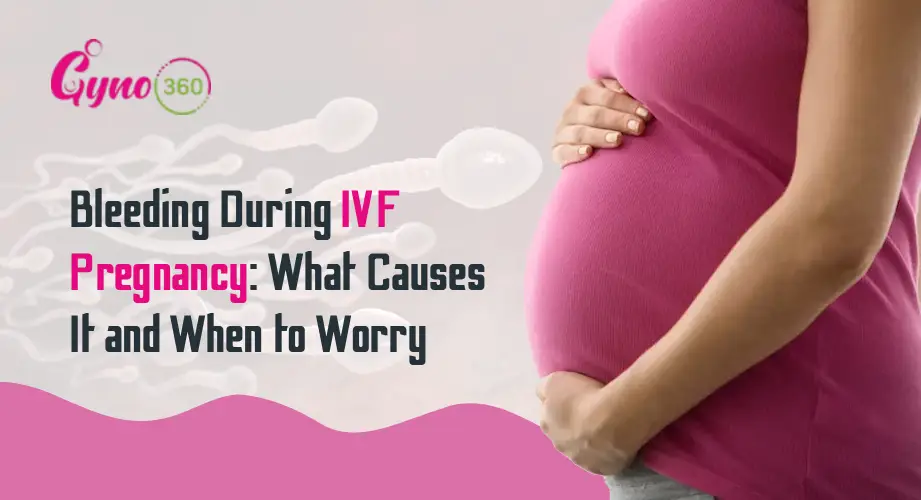For infertile individuals and couples, in vitro fertilization (IVF) offers hope. A positive pregnancy test might feel like a long-awaited prize after the anxiety, expense, and mood swings of treatment. But that happiness can be quickly transformed into fear if bleeding occurs during an IVF pregnancy. In early pregnancy, bleeding is frequent, particularly with IVF. It’s important to know what causes it and when to get medical help.
During an IVF pregnancy, is bleeding normal?
Yes, even with IVF pregnancies, minor bleeding or spotting is somewhat usual in the early stages of pregnancy. According to research, bleeding may occur in as many as 40% of IVF pregnancies. It’s normal to be concerned, but not all bleeding indicates a serious issue. Many women who experience early bleeding go on to have pregnancies and kids who are completely healthy.
Common Reasons Why Women Bleed During IVF Pregnancy
There are several causes of bleeding in the early stages of pregnancy. Among the most frequent reasons are:
1. Bleeding during implantation
This happens six to twelve days after fertilization, when the embryo attaches to the uterine lining. Implantation may occur a few days following embryo transfer in IVF. Light spotting or pinkish discharge, which are frequently confused with an early period, can result from the process. This is one of the first indications of pregnancy and is often harmless.
2. Changes in Hormones
Spotting may result from early pregnancy hormonal changes. As IVF requires hormonal support, some women may experience mild bleeding as a result.
3. Pain in the Cervical Region
Particularly in the early stages of pregnancy, the cervix becomes more sensitive. Cervical irritation and minor spotting can result after procedures including vaginal patches, vaginal ultrasounds, and even sexual activity.
4. Subchorionic Bleeding
Blood buildup between the gestational sac and the uterus is the cause of this disease. It may or may not be accompanied by cramping and can result in mild to moderate bleeding. With relaxation and close observation, the majority of subchorionic bleeding goes away on its own.
5. Miscarriage
Regretfully, bleeding may occasionally be a sign of a miscarriage. Any pregnancy has some risk of miscarriage, but IVF pregnancies are significantly more likely to do so, especially for older women or those with underlying medical issues. Usually thicker than spotting, miscarriage-related bleeding can also cause cramping or tissue passing.
When to Be Worried and Get Medical Assistance
While not all bleeding requires immediate attention, several symptoms call for quick medical intervention:
- Rapid bleeding (soaking a pad for less than an hour)
- Blood clots and a bright, dark color
- Constant cramping or discomfort in the abdomen
- Shoulder discomfort, feeling dizzy, or vomiting (which might be signs of an unstable pregnancy)
- Tissue passage or big clots
- Bleeding after the initial month
See a physician or fertility expert right away if any of these symptoms appear.
Strategies for Handling Bleeding During IVF Pregnancy
- Stay Calm: It’s easier said than done, so try to maintain your composure. Hormone levels and pregnancy might be adversely affected by stress.
- Take Note of the Specifics: Note the bleeding’s color, quantity, and any related symptoms, as well as when it began. Your doctor can make a more accurate assessment of the problem with this information.
- Prevent Physical Strain: Get enough sleep. Until your doctor gives the all-clear, stay away from heavy lifting, physical exertion, and sexual activity.
- Maintain Medication: Unless specifically instructed, do not stop taking any IVF-prescribed medications. In the early stages of pregnancy, hormonal assistance is essential.
- Follow-up: To monitor the course of your pregnancy and spot any problems, your doctor can suggest blood tests (such as HCG and progesterone) or ultrasounds.
CONCLUSION
Although it is troubling, bleeding during an IVF pregnancy is not generally an indication of problems. Many women have safe pregnancies despite experiencing spotting or mild bleeding. However, you should always report any bleeding, no matter how slight, to your physician or fertility clinic. The likelihood of a successful result is great with the right assistance, monitoring, and medical attention.
It takes mental toughness, open communication with your medical team, and faith in your body to become pregnant, especially following IVF. You’re not alone if you’re bleeding, and assistance is available at every stage.

